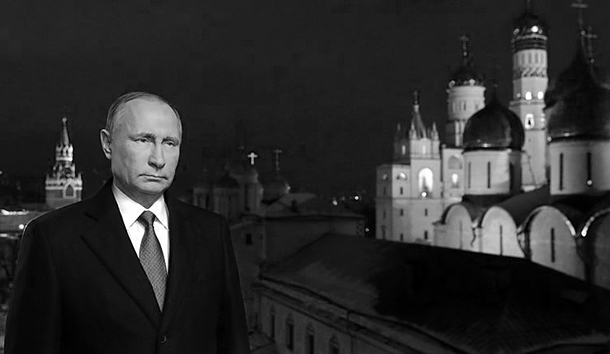
The only way the American political class will ever accommodate itself to the reality of post-Soviet Russia would be if that country succumbed to the second leftist revolution it has been trying for years to incite. Whether the revolutionaries called themselves communists or “liberal democrats” would make little or no difference so long as the result was “democratic” in the 21st-century American sense of the word—another “propositional” country, tyrannical abroad in the same way that the United States has been since 1945, and thus her “ally” (i.e., her partner in crime) internationally, and liberal-authoritarian at home in the way of postliberal America over the past several decades.
Franklin Roosevelt was sympathetic to the Soviet Union because he thought it “progressive” and because he had a personal rapport with Uncle Joe, because his wife also was a communist sympathizer, and because the advisors, appointees, and staff with whom he surrounded himself agreed with him. The large mass of the American public, on the other hand, despised and feared the Soviet Union, both as the face of an evil and subversive ideology and as a dangerous military opponent. The situation was the exact opposite (or almost) of today’s, when the Washington establishment loathes President Putin, while the majority of Americans seem either faintly admiring of him for not being Stalin or Khrushchev, or healthily indifferent to him and his policies, domestic and foreign. This is why American politicians and the American media have got precisely nowhere with their attempts simultaneously to rile up the country against Putin and to discredit Donald Trump by condemning the former’s “adventurism” and “meddling” in Syria and the latter’s insertion of himself into Israeli-American politics before his inauguration on January 20. In their zeal to damage both, they are overlooking a factor that may indeed prove key to the future of the political and military management of the Middle East. That is the developing relationship between Putin and Prime Minister Netanyahu, proximately inspired by their mutual dislike of Barack Obama but based on more substantial considerations as well.
Despite decades of enmity between Israel and Syria, and Russia’s successful military intervention on behalf of Assad against the Syrian revolutionaries, Moscow and Tel Aviv signed a security agreement last year permitting Russian planes accidentally to intrude upon Israeli airspace without reprisal. More recently, Putin has expressed his interest in promoting peace talks between the Israeli and Palestinian governments. These events need to be seen in the context of a rapprochement between Russia and Israel that has been driven for years now by the economic benefits the two countries receive from each other, and by the presence of large numbers of Russian Jewish émigrés in Israel. An article published by The American Spectator (“An Emerging Alliance: Russia and Israel,” December 15) considers these facts, and notes further that Russia, which has a substantial Muslim population, is nearly as concerned with the threat of Islamic terrorists at home as Israel is.
This is the situation into which Donald Trump’s critics accuse him of having “blundered” by taking Israel’s side against the U.N. resolution in December condemning her settlement policies in East Jerusalem and by pledging stronger support for Israel than she has received from the outgoing administration. Less partisan observers may wonder if Trump’s instincts rather explain his behavior, or even that a native diplomatic shrewdness allowed him to perceive an opportunity for the United States to shrug off responsibility at last for the Middle East and resign it to the powers whose stake in the future of the region is a proximate and direct one.
[Image credit: www.kremlin.ru]
Leave a Reply